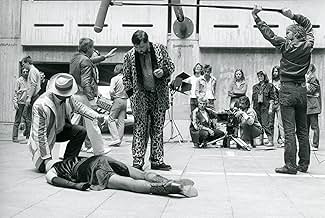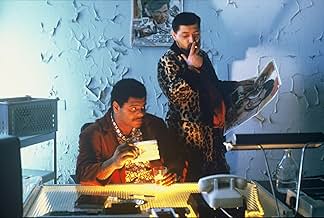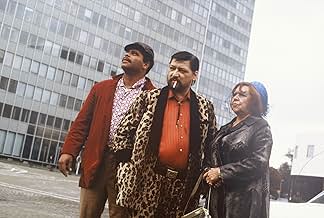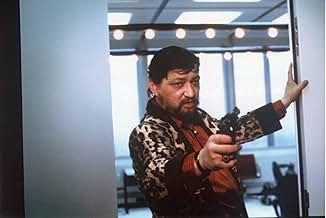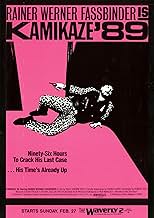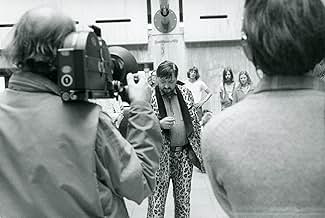Dans une société totalitaire du futur, dans laquelle le gouvernement contrôle toutes les facettes de la presse, un inspecteur de la criminelle enquête sur une série d'attentats à la bombe, e... Tout lireDans une société totalitaire du futur, dans laquelle le gouvernement contrôle toutes les facettes de la presse, un inspecteur de la criminelle enquête sur une série d'attentats à la bombe, et découvre plus qu'il ne l'avait prévu.Dans une société totalitaire du futur, dans laquelle le gouvernement contrôle toutes les facettes de la presse, un inspecteur de la criminelle enquête sur une série d'attentats à la bombe, et découvre plus qu'il ne l'avait prévu.
- Réalisation
- Scénario
- Casting principal
- Récompenses
- 1 victoire et 3 nominations au total
- Wechselschichtregisseur
- (as Andreas Mannkopf)
- Polizeiärztin
- (as Ute Fitz-Koska)
- Polizist
- (as Hans-Eckhardt Eckhardt)
Avis à la une
Being a big Fassbinder fan, I rented this with excitement. Fassbinder stars, and he's always fun to watch. It's one of those punk-future-dystopian movies that popped out a bit in the early '80s, always good for some cult fun. It came out at the end of Fassbinder's career, and Fassbinder's whole 12 year filmmaking period only got better and better until his end.
So half way through I thought "what the hell happened? This movie is an atrocity exhibition."
Then I glanced at the cover, and in horror noticed this movie was NOT directed by Fassbinder. He just starred in it in a coked up narcisstic haze. I read he actually wore that leopard outfit he was giving in this movie on and off again in the last few weeks of his life.
Fassbinder was proud of this movie, somehow, and that gives it an odd charm. It's horrendous, but I haven't regretted watching it. There's a scene where Fassbinder climbs to a roof of a building, odd buzzing music is playing and the wind is blowing his hair and he has this perverse smile on his face as he gazes out across the city. There's also the ending where Fassbinder, bloated, in a robe, girates his body against a photo of an astronaut (I'm guessing this is Fassbinder's input, as the exact same ending pretty much is used in Stationmaster's Wife). These two scenes made it worthwhile. Otherwise, mark it off as an awful "Alphaville" rippoff.
Police lieutenant Jansen, unforgettably played by Rainer Werner Fassbinder in his last role, is charged with the investigation, during which the open position of Krysmopompas is offered to him several times, but he refuses to take it over. Since the concern represents the good, the police must represent the evil. Even the police president is in the hand of the concern and looks like a caricature of Dr. Mabuse turned himself into a puppet. Possibly Jansen realizes that becoming Krysmopompas and thus fulfilling the vacuum of evilness would just consolidate the omnipotent concern, because it needs the evil to define itself as the good. Consequently, the director of the concern offers him a job, which Jansen also refuses. Therefore, Jansen takes a third position in a world in which there are only two, and this is presumably the reason why the movie is called "Kamikaze". However the title may be meant, this movie offers a highly complicated situation in which the categories of ethics are perverted. The typical 80ies' German TV-style of this movie should not make the audience blind that in portraying paradoxical ethical categories in a world in which metaphysics has been shoveled out like the alcohol, the seeds and suicide, "Kamikaze" goes way beyond thematically related movies like Godard's "Alphaville", Kubrik's "Dr. Strangelove" and even Tarkovsky's "Solyaris". A few years before "Kamikaze 1989", Fassbinder himself had directed the science-fiction movie "Welt am Draht" ("World on wire") which many people believe to have surpassed "Solyaris". In the final scene of Kamikaze, Fassbinder says his ultimate goodbye to his audience grinning in front of a picture of Armstrong's moon landing.
I am not sure whether this film would have been much better had it had the budget of Blade Runner or The Hunger Games, but I suspect that it would have been. On the other hand, we have grown accustomed to and now expect extremely fast-moving, often frenetic action in dystopic films. The pace here is incredibly slow, as though everyone is on some sort of downers (aside from the contestants in the Laughing Game, who are hooked up to IVs filled with hebephrenia-inducing drugs). Again: Huxley and Orwell already wrote it and others inspired by their works decided to dramatize the essence of dystopia.
Worth watching once, if only to see how later films may have been influenced by this creation.
NB: Among German film buffs bad German movies are rated in "Gremm-Einheiten" (Gremm units).
Le saviez-vous
- AnecdotesThis was the final acting role for Rainer Werner Fassbinder.
- GaffesThe movie claims 27 September 1989 to be a Monday, but that day was a Wednesday (The movie plays in 1989, as the title and a spoken intro make clear. The supposed explosion in the beginning of the movie was planned to take place on September 23, as Jansen points out. The chief of the police then urges Jansen to solve the case within for days, saying "until Monday afternoon," which would be September 27).
- Citations
Policewoman: Suicide
Polizeileutnant Jansen: It would be the first in four years.
Policewoman: Sorry, I meant 'premature death.
- ConnexionsFeatured in Fassbinder (2015)
Meilleurs choix
- How long is Kamikaze 89?Alimenté par Alexa
Détails
Box-office
- Montant brut aux États-Unis et au Canada
- 22 440 $US
- Week-end de sortie aux États-Unis et au Canada
- 5 613 $US
- 5 juin 2016
- Montant brut mondial
- 22 440 $US


